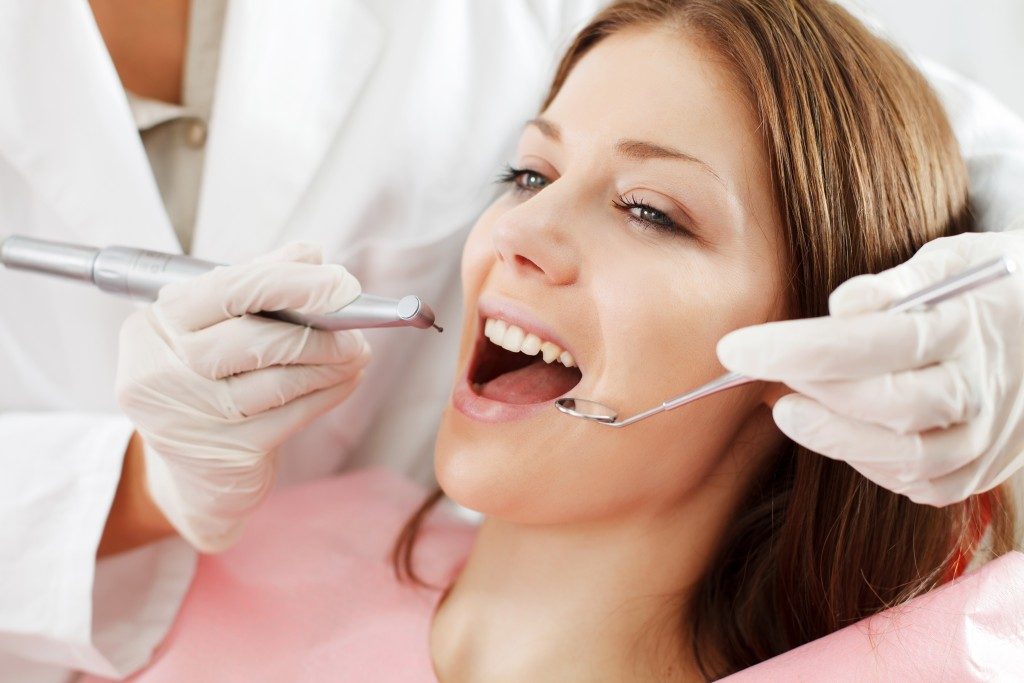 Seeing a little bit of blood when you spit your toothpaste out isn’t a big deal on most occasions. It happens when you inadvertently poke the fragile tissues in your mouth or when you just ate coarse food. But, if you see red every single time you do your morning and evening brush rituals, it should very well be a cause of concern. Here are possible reasons you’re experiencing such:
Seeing a little bit of blood when you spit your toothpaste out isn’t a big deal on most occasions. It happens when you inadvertently poke the fragile tissues in your mouth or when you just ate coarse food. But, if you see red every single time you do your morning and evening brush rituals, it should very well be a cause of concern. Here are possible reasons you’re experiencing such:
You’re suffering from gingivitis.
When plaque remains on the gumline for far too long, it can result in gingivitis. Its hallmark symptom? You guessed it: sensitive, bleeding gums. When left untreated, the problem can trigger a lot of complications. You can develop an abscess or an infection in the gums or jaw bone. You may suffer from trench mouth, an infection that results in ulceration of the gums. The worst problem is periodontitis, a serious condition that inevitably leads to tooth loss. To avoid these, make sure to clean your mouth thoroughly and frequently. Pay attention to the gum line, where food debris often gets stuck. Tilt your brush in a 45-degree angle to your gums so you can wipe them clean. Go in for regular dental appointments as well. Your dentist should give you the routine cleaning in these visits.
Your hormones are fluctuating.
It’s a scientific fact that women are more at risk for bleeding gums than men. That’s because your hormone levels tend to fluctuate more erratically. Estrogen and progesterone cause more blood to flow to the gums. Those tissues then become more sensitive that they easily get irritated at the slightest hint of plaque or bacteria. You’ll notice your gums swollen and bleeding when brushing teeth. Now, this doesn’t mean you’re doomed to have gum problems whenever it’s that time of the month or when you’re pregnant. This just means you have to be more careful and diligent in your oral care habits during these times, as well as when you’re using birth control pills or entering menopause. Again, regular visits to the dentist are important. Especially when you’re expecting. You don’t want oral conditions affecting your growing baby. Consider going to a clinic in Fort Worth that offers your specific dental care.
You’re taking certain drugs.
 There’s a good reason dentists always ask you if you’re taking medications when you visit them. Some drugs can alter the state of your oral health. For instance, some blood pressure medicines and immuno-suppressants can trigger gum inflammation and therefore would make you prone to bleeding. On the other hand, some antihistamines, decongestants, and diuretics can cause dry mouth, a risk factor for gum problems. Remember, your mouth needs a steady supply of saliva to wash away food residue and fight the acids from bacteria irritating the gums. Your doctor should be able to prescribe alternative drugs or dosages or lifestyle changes to keep you from having a dry mouth.
There’s a good reason dentists always ask you if you’re taking medications when you visit them. Some drugs can alter the state of your oral health. For instance, some blood pressure medicines and immuno-suppressants can trigger gum inflammation and therefore would make you prone to bleeding. On the other hand, some antihistamines, decongestants, and diuretics can cause dry mouth, a risk factor for gum problems. Remember, your mouth needs a steady supply of saliva to wash away food residue and fight the acids from bacteria irritating the gums. Your doctor should be able to prescribe alternative drugs or dosages or lifestyle changes to keep you from having a dry mouth.
It’s not just your overly vigorous brushing that makes your gums bleed. If you constantly see blood in your toothpaste spit, it’s possible that it’s due to a more serious oral condition, a hormonal roller coaster, or meds in your pillbox.

